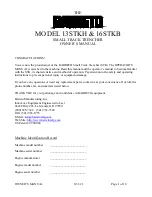
667/CI/32755/000 issue 5 (20.01.2015)
Page 1 of 2
ST700/ST750
H
ELIOS
CLS
NLM
R
ETROFIT
I
NSTALLATION
N
OTE
WARNING – ONLY TRAINED AND COMPETENT PERSONNEL SHOULD ATTEMPT TO UNDERTAKE THIS INSTALLATION.
Installation should only be carried out by persons who are adequately trained, have a full understanding of the needs of the county or region
were the controller is to be used and are experienced in the tasks to be undertaken.
This note is intended to act as a reminder only. Full details of the installation procedure may be found in the Handbook Supplement for
Monitoring Helios CLS (NLM) Signals 667/HB/32921/007. Installation engineers must first consult that handbook supplement and ensure that
they are fully familiar with its content before undertaking installation. Note: it is recommended that individual ground returns are used for each
green signal. Refer to Traffic Signal Junction Cabling Design Certification 667/DS/20664/000 for more info
OVERVIEW:
The ST700/ST750 Helios CLS NLM Retrofit is a kit designed to upgrade an existing ST700/ST750 Site to incorporate Helios
CLS (NLM) LED Traffic Signals. This Retrofit Kit is available in both HELIOS and PEEK ELITE bodies.
EQUIPMENT
667/1/32755/7nn ST700 or ST750 Retrofit kit
667/1/31500/ETC CLS NLM Door Kit(s)
667/1/27002/002 UK Lamp Switch Kit(s)
667/1/27002/102 Non-UK Lamp Switch Kit(s)
667/1/33540/ETC Peek Elite Retrofit CLS NLM Door Kit(s)
TOOLS REQUIRED
‘T’ Key
Cabinet Access key
M3 Nut Spinner
(5mm Socket)
Side Cutters
Handset
Medium
crosshead
screwdriver
Firmware PROM
Extractor Tool
2.5 A/F Small Allen
Key (PEEK only)
UPGRADE PROCEDURE
Before starting, consider using IC4 View Differences to extract
any changes to the controller’s configuration data before
changing the Firmware or Configuration PROM.
1.
Switch Off the mains power at the Master Switch. Lock
this switch in the OFF position and confirm the supply is
isolated.
2.
Upgrade the traffic signals, taking care to ensure that the
door seals are fully compressed before locking hinges.
After upgrading the signals, if any changes are made to
the earth connections, ’Minor Works’ electrical testing as
required in 667/HE/20664/000 must be completed.
3.
Remove or bypass the 230/48V Wait transformers.
4.
Remove external lamp monitoring sensors for additional
vehicle RLM channels and Pedestrian Red/Green
signals.
5.
Replace the Phase Driver PCB as detailed overleaf.
6.
Upgrade the Firmware PROM, ST700 needs
667/TZ/12800/000 “PB800” issue 27 or later, and ST750
needs 667/TZ/12801/000 “PB801” issue 11 or later.
7.
If necessary, change configuration PROM. Confirm that
the configuration has been generated by a competent
person in accordance with the required procedures in
place for the county and region.
NOTE:
A site can usually be upgraded to LV CLS without
changing the configuration PROM; it depends on the signals
types and monitoring required.
8.
Switch the signals to OFF using the Signals On/Off
switch on the manual panel and Power on.
9.
Download the IC4 configuration into the CPU PCB, and
customise it using the handset mnemonics detailed in the
Special Instructions. Follow usual configuration
procedures.
10.
Make any adjustments to the controller’s timings and
settings identified by IC4 View Differences, and marked
up on the IC4 Printout in the controller cabinet.
11.
If the KLV value is zero, select the applicable KLV value:
If Siemens/Dialight Helios CLS signals are fitted, use
KLV=3 (no far-side peds) or KLV=4 (far-side peds).
If Siemens/Futurit Helios CLS signals are fitted, use
KLV=5 (no far-side peds) or KLV=6 (far-side peds).
12.
Review and if necessary correct the KLT settings for ALL
the sensors (see KLT table below/right).
13.
Enter KLR=1 to reset the lamp monitor.
14.
Enter RFL=1 and Power off/on to clear the FLF 2:10 fault
and illuminate the traffic signals.
15.
Measure the actual bright lamp supply. If this differs from
the value displayed by the handset command KEV, enter
the correct value, e.g. KEV=239 to calibrate the
controller’s reading.
16.
Check the dim lamp supply voltage;
Measure the actual dim voltage and check that it is
no higher than 160V. If dim voltage is higher, move
the input to the next higher tap, e.g. from the 230V
input tap to the 240V input tap.
If the dim voltage is still higher than 160V, then the
140V tap can be used to reduce the dimming
voltage further.
Use of the 120V tap is not supported with ‘Helios
CLS (NLM)’ signals.
17.
If any changes are made to the transformer connections;
enter KLR=1 to reset the lamp monitor and re-learn the
loads.
18.
Check lamp monitoring learning;
Detailed in Controller Handset Handbook (/HH/)
Check using the KEL handset command that the
number of watts learnt equates to the correct
number of signals fitted; ‘Helios CLS (NLM)’
consume between 10W and 15W.
NOTE:
The KES and KEL handset commands will show 0mA
and 0W respectively for ‘Red,Wt’ if Helios CLS are fitted;
monitoring is disabled while the Waits are illuminated.
19.
Upgrade Complete. Follow usual commissioning
procedures for completion of site installation.
KLV : <Lamp Supply Voltage Type: 0 to 4>
The configured
L
amp Supply
V
oltage Type.
Value Description
KLV:0 200-240V (original lamp types)
KLV:1 100-120V (original lamp types)
KLV:2 48V (ST900ELV & ST750ELV only)
KLV=3 230V Siemens/Dialight CLS Traffic / Ped monitor disabled
KLV=4 230V Siemens/Dialight CLS Traffic
and
Ped
KLV=5 230V Siemens/Futurit CLS Traffic / Ped monitor disabled
KLV=6 230V Siemens/Futurit CLS Traffic
and
Ped
Note – Nearside Ped & Demand cannot be monitored – use KLV=3
KLT <Sensor 1 to 48> : <Load type 0 to 255>
L
oad
T
ype for each lamp monitor sensor.
KLT Signal Types
0 Monitoring Disabled
1
Siemens/Dialight Helios CLS (NLM)
(typically in signals supplied without LMF units)
10
Siemens/Futurit Helios CLS with LMF removed
(typically in signals originally supplied with LMF units)
255
Original Lamp Types – Includes incandescent lamps,
‘Helios LED’, ‘Helios CLS+LMF’ and fluorescent tubes.
Not applicable to Traffic RAG or PED R/G Signals




















